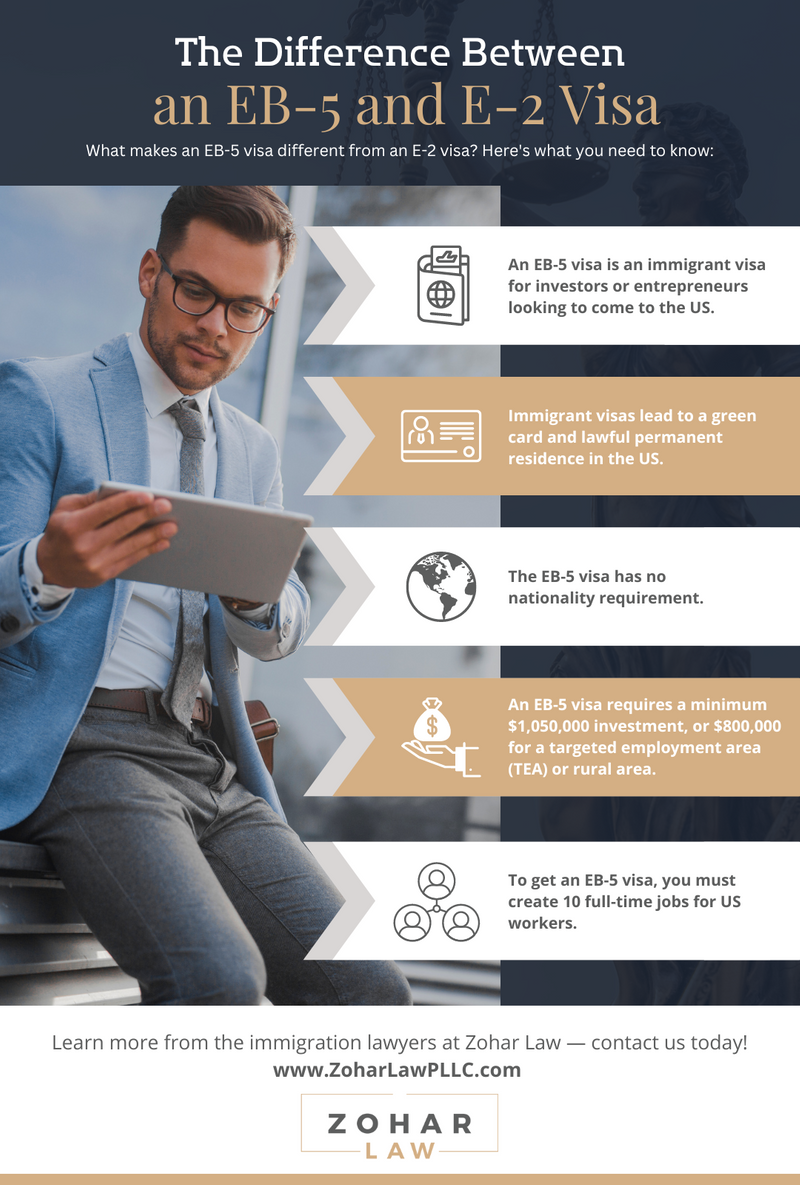The EB-5 Visa is a popular investment visa that offers many benefits to its holders. If you are interested in obtaining an EB-5 visa, it is important to know the requirements and what the process entails. In this blog post from Zohar Law in New York, we will discuss the EB-5 Visa in detail and answer some of the most common questions about it. So, if you are considering applying for an EB-5 Visa, keep reading!
What is the EB-5 Visa and What Are the Requirements
What is the EB-5 Visa and What Are the Requirements

What Is the EB-5 Visa?
The Employment-Based Fifth Preference Visa, or EB-5 visa, is a lawful permanent resident status visa designed to allow you to live and work in the United States. The investor must make an investment in a business located in the United States that will create, or save, ten full-time jobs for American workers. After two years, the visa holder must be able to show that their investment resulted in the creation or retention of enough employment to merit entry into the United States. The green card will then be renewed as a result of their evidence.
The EB-5 Visa was established in 1990 to assist the American economy by encouraging job creation and capital investment from investors from other nations. In addition, two years later, Congress created the Immigrant Investor Program to assist foreign nationals who are participating in the EB-5 program by allowing them to invest in commercial enterprises linked with USCIS-approved regional centers. Investors who wish to apply for this green card must invest $800K (for a Targeted Employment Area or TEA) or $1.2M anywhere else.
It should also be noted that in June 2022, a preliminary injunction was granted against USCIS, ending regional centers’ “deauthorized” status that resulted from the EB-5 Reform and Integrity Act of 2022, which would’ve required previously designated EB-5 regional centers to “redesignate” under the new law.

The Components of the EB-5 Visa
The EB-5 visa, as opposed to the E-2 visa, is a permanent residency Visa. It lasts two years and then expires. Because it's based on a business, the EB-5 is a conditional green card. If you can demonstrate that the firm you invested in has a good probability of being able to hire the optimal number of workers in two years, you may continue to retain your green card under the EB-5. If you can't prove that your firm will be able to employ the right number of employees in two years, your green card will be revoked.
Furthermore, just because you wish to invest in an American business does not guarantee that you will be accepted for an EB-5 visa. As with every visa or green card, nothing is guaranteed, and the USCIS can reject people who apply to this category because the eligibility is so small. This type of green card has a long history of fraud and abuse, which is why it may be more difficult to obtain from the EB-5 program. Finally, if you can invest in a for-profit American firm and show that you are involved with the process, you don't need any business training.

Determining the Source of Funds
The USCIS is interested in making sure that the funds used to make the investment are legal to avoid instances of money laundering. Therefore, they will want to see documentation that proves the source of your funds. This can be in the form of bank statements, tax returns, and/or other financial documents. It is important to have this documentation ready when you apply. Proving the lawful source and route of their investment funds is essential for EB-5 investors.
In rare instances, a petitioner may acquire their investment money through an inheritance. In such a scenario, the applicant must submit all relevant paperwork pertaining to the inheritance, including estate settlements of the deceased.
Another possible source of funds is gifts. All related documents, including the registration of the gift money for tax purposes, must be disclosed.
The money derived from divorce and other legal procedures may be used. Alimony, as well as funds obtained through civil lawsuits and court judgments, are examples of this.

Job Creation Requirements
For the EB-5 immigrant investor program, USCIS requires that each investment result in the creation or retention of at least 10 full-time jobs for United States workers. These positions must be established within two years of the immigrant investor's receipt of his or her conditional permanent residency.
In the case of a direct investment into an EB-5 project, the investor must be able to demonstrate that his or her money resulted in the creation of specialized jobs for people who worked inside the commercial entity that benefited from the investment.
The investment can be a direct investment (create your own business) or through a regional center (a job creating project that has been vetted by immigration). The regional center program has just been recertified recently and can take investments again. Investors who invested through a regional center may claim 10 full-time direct, indirect, or induced jobs as a result of their investment. Induced jobs are those created in firms that use the EB-5 project's output to generate income. Induced employment is generated in the community as a result of EB-5 project employees' expenditures.

How Zohar Law Immigration Lawyers Can Help You
Zohar Law PLLC is a law firm based in New York, New York. We at Zohar Law are able to assist you with obtaining green cards, visas, and other immigration services because we specialize in immigration law. We aim to help keep families together rather than seeing them torn apart. We want to assist individuals who wish to live and thrive in the United States. It might be difficult being an immigrant, but having a competent, honest, and able immigration lawyer on your side can help you achieve more success. For further information about how we can help you, don’t hesitate to contact us!
